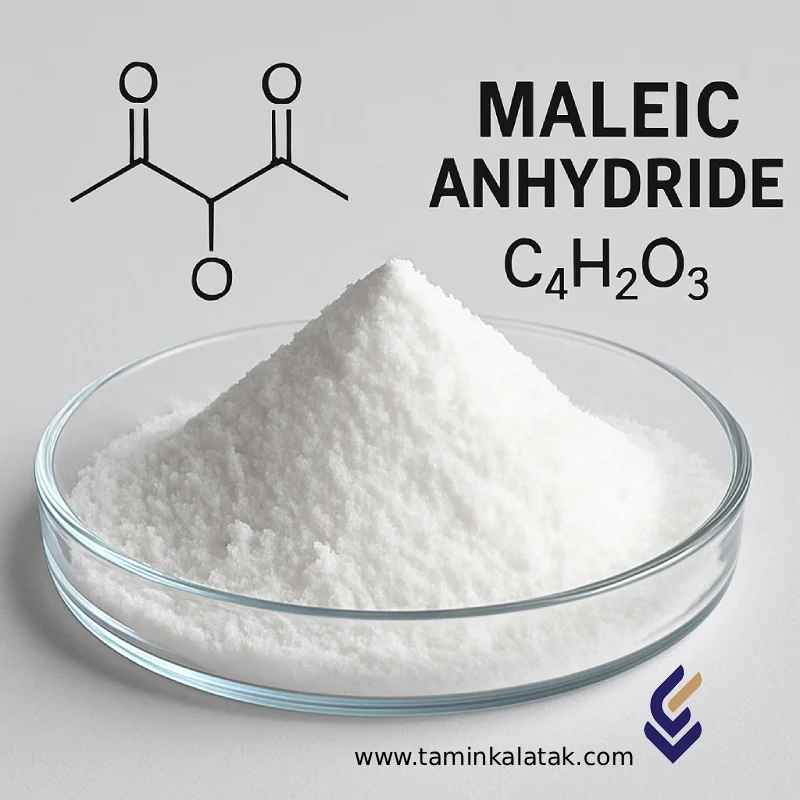Maleic anhydride
Maleic Anhydride is a highly important chemical intermediate widely used across multiple industries including polyester resins, coatings, pharmaceuticals, agrochemicals, and industrial additives.
It appears as a white to colorless crystalline solid with a sharp, acrid odor, and serves as a key raw material in the manufacture of unsaturated polyester resins (UPR), copolymers, and specialty chemicals.
Chemical Structure
-
Chemical Name (IUPAC): 2,5-Furandione
-
Molecular Formula: C₄H₂O₃
-
Structure Type: A reactive five-membered cyclic anhydride derived from maleic acid, exhibiting high electrophilicity — ideal for Diels–Alder, polymerization, and surface-modification reactions.
Physical and Chemical Properties
| Property | Specification |
|---|---|
| Appearance | White or colorless crystalline solid with a pungent odor |
| Molecular Weight | 98.06 g/mol |
| Density (20 °C) | ~1.48 g/cm³ |
| Melting Point | 52–56 °C |
| Boiling Point | ~202 °C at 760 mmHg (decomposes upon heating) |
| Vapor Pressure (20 °C) | ~0.16 mmHg |
| Solubility in Water (25 °C) | ~79 g/L – hydrolyzes rapidly to maleic acid |
| Stability | Moisture-sensitive; reacts exothermically with water |
| Odor | Sharp, irritating |
Key Advantages
-
Essential intermediate for unsaturated polyester resins (UPR) used in FRP composites, coatings, and laminates
-
Starting material in the synthesis of 1,4-butanediol, tetrahydrofuran (THF), γ-butyrolactone (GBL), and other specialty monomers
-
Used in surfactants, agrochemical formulations, and personal care ingredients
-
Base component for engineering copolymers such as styrene–maleic anhydride (SMA)
-
High reactivity enables efficient chemical modifications and surface treatments
Limitations and Hazards
-
Corrosive and strong irritant to skin, eyes, and respiratory tract
-
May cause skin and respiratory sensitization (H317, H334)
-
Dust may form explosive mixtures with air — proper dust control required
-
Hydrolyzes quickly in humid air to maleic acid, reducing stability
-
Requires dry, controlled storage and careful handling
Applications
-
Polyester Resins (UPR): Used in FRP, coatings, adhesives, and gel coats
-
Plasticizers & PVC Modifiers: Improves flexibility and chemical resistance
-
Pharmaceuticals: Intermediate in the synthesis of active pharmaceutical ingredients (APIs)
-
Agrochemicals & Detergents: Intermediate for surfactants, wetting agents, and additives
-
Copolymers: Base monomer for SMA, ABS modification, and compatibilizers in polymer blends
Safety and Handling Information
GHS Classification: Corrosive / Harmful
Signal Word: ⚠️ DANGER
Hazard Statements:
-
H302: Harmful if swallowed
-
H314: Causes severe skin burns and eye damage
-
H317: May cause allergic skin reaction
-
H335: May cause respiratory irritation
-
H373: May cause damage to organs through prolonged exposure
Recommended PPE:
-
Chemical-resistant gloves (nitrile or butyl rubber)
-
Protective clothing and safety goggles or face shield
-
Dust mask or approved respirator (for airborne particulates)
Storage and Stability
-
Store in a cool, dry, well-ventilated area
-
Keep containers tightly closed and protected from moisture
-
Avoid exposure to heat, sparks, or open flames
-
Use non-corrosive, moisture-proof packaging (lined drums or bags)
Emergency Measures
-
Skin/Eye Contact: Flush immediately with water for at least 15 minutes; seek medical attention
-
Inhalation: Move person to fresh air; seek medical advice if symptoms persist
-
Ingestion: Do not induce vomiting; seek immediate medical assistance
-
Spillage: Avoid dust formation; collect dry and store safely for disposal
Summary
Maleic Anhydride is a versatile and reactive intermediate essential in polyester resins, copolymers, and chemical synthesis.
Its high reactivity, industrial relevance, and broad compatibility with organic systems make it a key material in modern chemical production — provided it is handled under strict safety and storage protocols.
Applications
| Applications | , , , |
|---|
Maleic anhydride
| Solubility in water | Melting point | Density (at 20°C) | Physical appearance | Vapor pressure | Grade | CAS number | Chemical formula | Products |
|---|---|---|---|---|---|---|---|---|
| ~79 g/L at 25 °C (by hydrolysis to maleic acid) | 52–56 °C | ~1.48 g/cm³ | White to colorless solid, crystal or powder with a pungent, irritating odor. | ~0.16 mmHg | (Industrial grade)، (Reagent grade) (Pharma grade) | 108-31-6 | C₄H₂O₃ | انیدرید مالئیک (Maleic Anhydride) |







